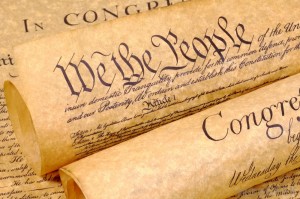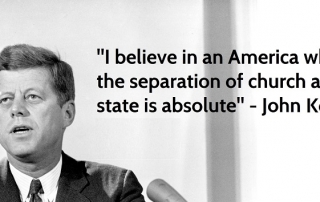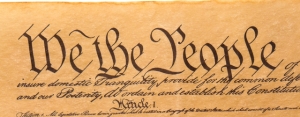Overview
 The first freedom protected by the Bill of Rights is the right of every American to a secular government that does not subscribe to religious beliefs or prohibit citizen engagement in private religious practices. It is the first of several pronouncements in the First Amendment to the United States Constitution. A religion having many members, or an action being popular, provides no constitutional argument in favor of entangling religion and law.
The first freedom protected by the Bill of Rights is the right of every American to a secular government that does not subscribe to religious beliefs or prohibit citizen engagement in private religious practices. It is the first of several pronouncements in the First Amendment to the United States Constitution. A religion having many members, or an action being popular, provides no constitutional argument in favor of entangling religion and law.
Our Recommendations on Constitutional Issues
SECULAR RECOMMENDATIONS ON THE FREE EXERCISE CLAUSE
The wall of separation of church and state protects both freedom from government-sponsored religion and a private individualÔÇÖs freedom of conscience. This reflects the Madisonian concern that secular and religious authorities must not interfere with each otherÔÇÖs respective spheres of choice and influence. The Free Exercise Clause forbids the government from interfering with religious belief, opinion and some, but not all, actions taken with religious motives. While the freedom to believe is absolute, the freedom to act may be circumscribed by law, so long as [...]
SECULAR RECOMMENDATIONS ON THE ESTABLISHMENT CLAUSE
Introduction In 1947, the first modern Establishment Clause case made its way to the Supreme Court, and the Court ruled that the Fourteenth Amendment applies the clause to all levels of government. The Supreme Court has since interpreted the Establishment Clause in dozens of cases. Certain general principles have emerged from the CourtÔÇÖs jurisprudence. Separation of church and state means ÔÇ£that government may not promote or affiliate itself with any religious doctrine or organisation, may not discriminate among persons on the basis of their religious [...]
SECULAR RECOMMENDATIONS ON CONSTITUTIONAL HISTORY
The first freedom protected by the Bill of Rights is the right of every American to a secular government that does not subscribe to religious beliefs or prohibit citizen engagement in private religious practices. Thomas Jefferson, in a famous letter to the Danbury Baptist association in 1802, expressed his ÔÇ£sovereign reverence that act of the whole American people which declared that their legislature should ÔÇÿmake no law respecting an establishment of religion, or prohibiting the free exercise thereof,ÔÇÖ thus building a wall of [...]



